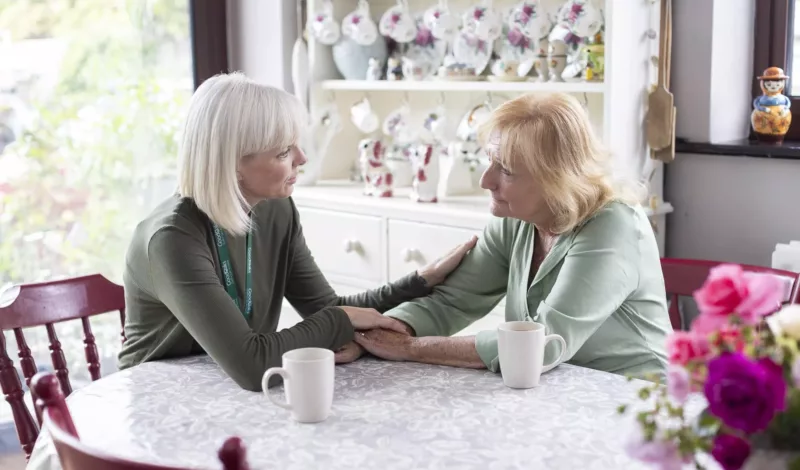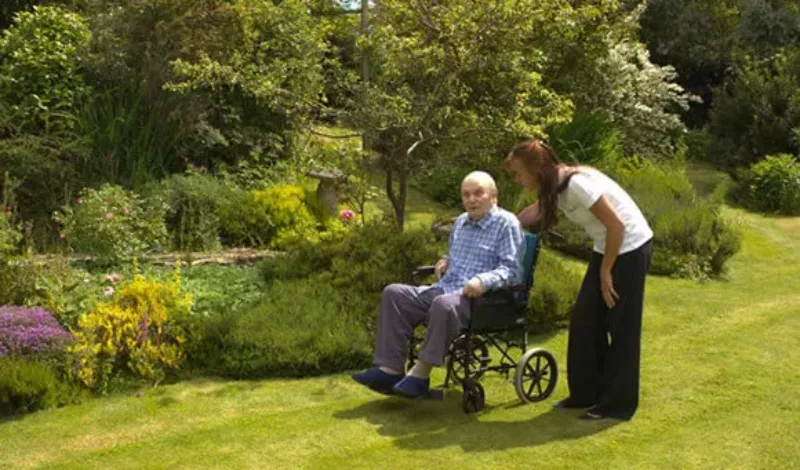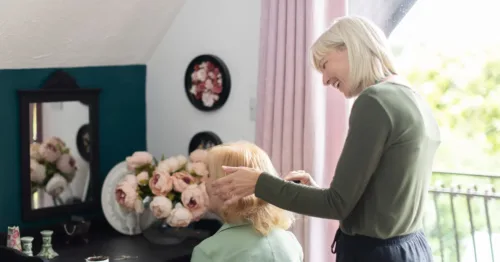
Homecare, also known as ‘domiciliary care’, is a type of support that enables people to live independently and safely in their own homes, rather than moving into residential care. It involves trained carers visiting someone at home to help with everyday tasks, whether that involves personal care and medication support to meal preparation, companionship and household chores.
Homecare is flexible and tailored to each person’s needs. It can range from short, hourly visits a few times a week to full-time live-in care. Whether someone needs help getting dressed in the morning, support after coming out of hospital or more complex care for a condition like dementia, homecare offers the right level of support, delivered with dignity, compassion and respect.

Who needs homecare? Understanding when it’s time to get some extra help around the home
Homecare is for anyone that decides they, or their loved one, would benefit from additional help around the house in order to maintain independence. It’s not always easy to know when to bring in extra support, but asking the right questions can help you recognise the signs that homecare may be needed:
- Is your loved one struggling with everyday tasks like washing, dressing or making meals?
These are common signs that someone may benefit from support with personal care and daily living.
- Have you noticed a decline in mobility or more frequent falls?
A carer can help with moving around safely, using mobility aids and reducing the risk of injury.
- Are there signs of forgetfulness, confusion or a dementia diagnosis?
People living with dementia often need structured, familiar routines and gentle support from trained carers.
- Is medication being missed or taken incorrectly?
Carers can prompt or administer medication, ensuring it’s taken on time and as prescribed.
- Are family members finding it hard to manage everything on their own?
Whether due to work, distance or burnout, it’s OK to seek professional help when care becomes overwhelming.
- Is your loved one becoming socially isolated or lonely?
Homecare isn’t just practical, it also provides valuable companionship and emotional support.
- Has there been a recent hospital stay, illness or decline in health?
Recovery is often quicker and safer at home with the right care and encouragement.
- Is your loved one struggling to maintain independence but wants to stay in the comfort of their own home?
Many elderly people find the idea of moving to a residential care home daunting and what to remain in their own home. Homecare is the perfect option in this instance.
Recognising these signs early can help prevent crises and ensure your loved one receives the care and dignity they deserve.

Live-in care vs. visiting care – What level of support is required?
When arranging care at home, one of the first decisions to make is whether visiting care or live-in care is more appropriate. Both options offer high-quality, personalised support but the right choice depends on how much help is needed and how often.
Visiting care: flexible support, little and often
- Visiting care involves carers coming to the home at agreed times during the day, from short visits once or twice a week, to several visits daily. It’s ideal for those who can manage most of the day independently but need help with specific tasks like personal care, medication, mobility or meal preparation.
Best suited for:
- Older adults who need help getting up, washed and dressed.
- People recovering from surgery or illness.
- Those with early-stage dementia or mild mobility issues.
- Family carers who need extra support during busy times.
Limitations:
- Not suitable for people who need overnight care or constant supervision.
- Gaps between visits may leave vulnerable individuals without support for long periods.
Live-in care: round-the-clock reassurance
- Live-in care provides continuous support, with a fully trained carer living in the home. They’re on hand throughout the day (and available at night when agreed), offering practical help, companionship and peace of mind.
Best suited for:
- Individuals with complex care needs or advanced medical conditions
- People with dementia who need consistent routines and close monitoring
- Those who would otherwise require residential care but prefer to stay at home
- Couples who both need support but want to continue living together
Limitations:
- Requires a spare bedroom and suitable space for a carer to live comfortably
- Typically more expensive than visiting care due to the level of involvement
At GoodOaks, we can help you decide which type of care is most appropriate based on your needs, preferences and lifestyle. Whether you need help a few times a week or full-time support, we’re here to make life easier with care that’s as individual as you are.

What specialist homecare services can you get?
Homecare isn’t just about general support, it can also include a range of specialist services tailored to individual health conditions and personal circumstances. All of the below types of care services are available to you or your loved one at home.
- Personal care
Help with washing, dressing, toileting, grooming and maintaining personal hygiene, always delivered with dignity and respect.
- After hospital care
Support during recovery after a hospital stay, helping with mobility, medication and daily routines to aid a safe and comfortable return home.
- After stroke care
Tailored care for stroke survivors focusing on rehabilitation, safety and restoring as much independence as possible at home.
- Respite care
Temporary care to give family carers a break, whether it’s for a few hours, a few days or longer, providing peace of mind that your loved one is in safe hands.
- Dementia care
Specialised support for people living with dementia, offering structure, familiarity and patient, understanding care from trained professionals.
- Companionship
Friendly carers offering conversation, emotional support, and company, helping to reduce loneliness and improve wellbeing.
- Specialist care
For those with more complex health needs, we offer personalised care plans and trained carers with the skills to manage advanced or ongoing conditions.
- Emergency care
Rapid-response support when care is needed urgently, such as after an unexpected illness or when a regular carer becomes unavailable.
- Learning and physical disabilities care
Sensitive, empowering care for individuals with learning difficulties or physical disabilities, helping them live safely and independently in their own home.

How to choose a reputable homecare provider
Choosing a homecare provider is a big decision and it’s not just about finding help with daily tasks, but trusting someone to care for you or a loved one with compassion, respect and professionalism. Here are some key things to look for when choosing a high-quality, reputable homecare provider:
- CQC registration and ratings
In England, all homecare providers must be registered with the Care Quality Commission (CQC). Look for providers with a “Good” or “Outstanding” rating. This means they meet high standards of safety, effectiveness, care, responsiveness and leadership.
- Thorough training and vetting of care professionals
Reputable providers invest in comprehensive training, regular updates and background checks for all their care staff. Ask about induction programmes, ongoing training and how carers are matched to clients. Find out more about the training our care professionals receive here.
- A strong, supportive management team
Behind every good carer is a reliable care team. Look for providers with a local office and a dedicated management team who are easy to contact, responsive and regularly review care plans.
- Positive reviews and testimonials
Reading feedback from other clients and families can give you a clear picture of the provider’s service. Check online reviews, testimonials on their website,and independent review platforms.
- Awards and accreditations
Industry awards (such as the Home Care Awards), memberships in professional bodies and quality accreditations show a provider’s commitment to excellence and continuous improvement.
- Additional campaigns and values
Providers who support campaigns such as the Dignity in Care campaign show a commitment to treating people with respect, choice, and compassion, values that are essential in quality care.
At GoodOaks Homecare, we’re proud to be CQC regulated, Dignity in Care registered and recognised for our high standards, compassionate carers and responsive local teams. We believe great care starts with great people and we’re here to help you every step of the way.

How to get homecare
The process of arranging homecare begins with a conversation. Contacting a trusted provider like GoodOaks is the first step. We’ll talk through your situation, answer any questions and arrange a free, no-obligation home assessment.
During this visit, a member of our care team will come to your home to understand your needs, lifestyle and preferences in detail. This helps us create a tailored care plan that’s built around you or your loved one.
Once the care plan is agreed, we’ll carefully match you with a trained carer who suits your needs and personality. Together, we’ll set a schedule that fits around your daily routine, whether it’s a few visits a week or full-time live-in care.
We’ll also guide you through funding options, whether you’re paying privately or exploring local authority support. With everything in place, care can start quickly, with ongoing support and regular reviews from your local GoodOaks team to ensure things continue to run smoothly.

Homecare vs. care homes – What’s the difference?
Both homecare and care homes offer valuable support, but they provide it in very different ways. Homecare allows you to stay in the comfort and familiarity of your own home while receiving personalised care tailored to your daily routine. Whether it’s help with washing, dressing, medication or simply companionship, carers visit as often as needed, or live in full-time, offering one-to-one support.
In contrast, care homes are residential settings where individuals move into a shared environment with other residents and receive care from staff on-site. While care homes provide 24/7 supervision, they often come with less flexibility and privacy, as routines are set to accommodate the needs of many.
Homecare is ideal for those who wish to maintain independence, remain close to loved ones or pets and keep control over their lifestyle. Care homes may be more suitable for people with very complex needs who require constant medical oversight, though live-in care is increasingly being chosen as a more personal, home-based alternative to residential care.
If you’re keen to find out more about how home care would benefit you or your loved one, contact our friendly, knowledgeable team today.



